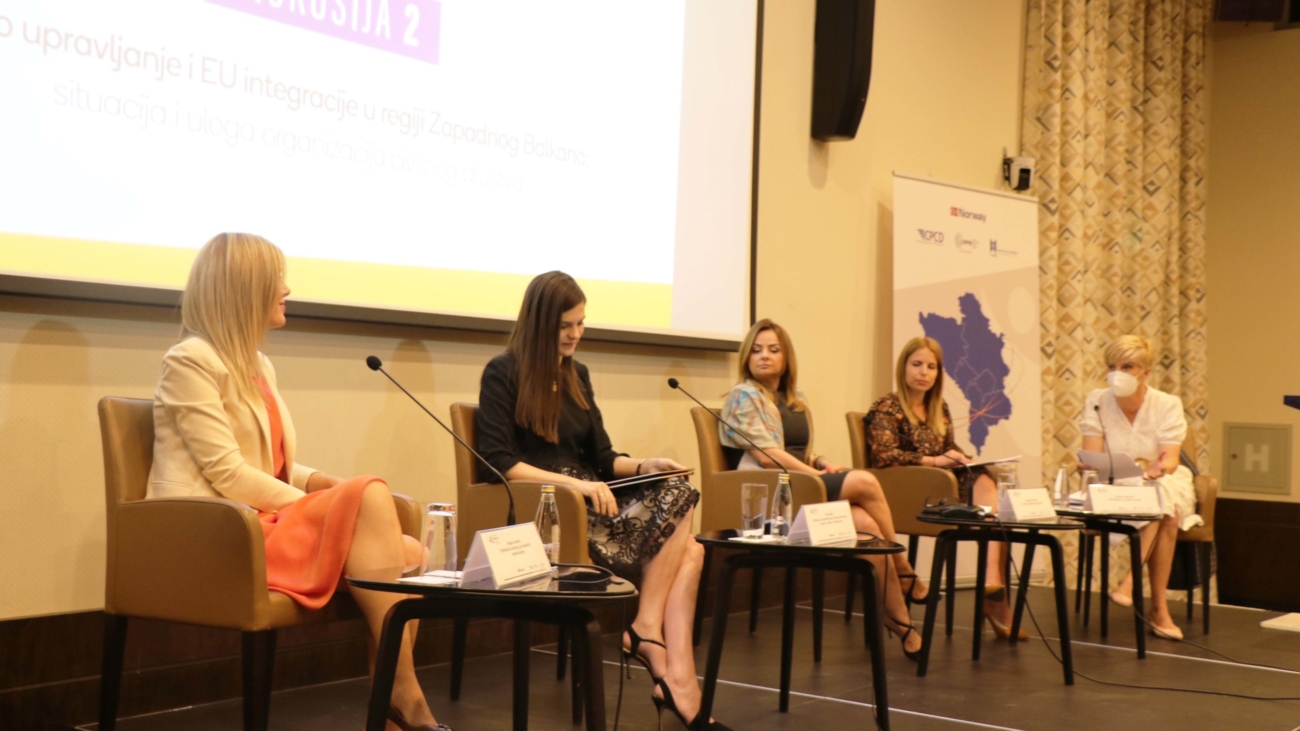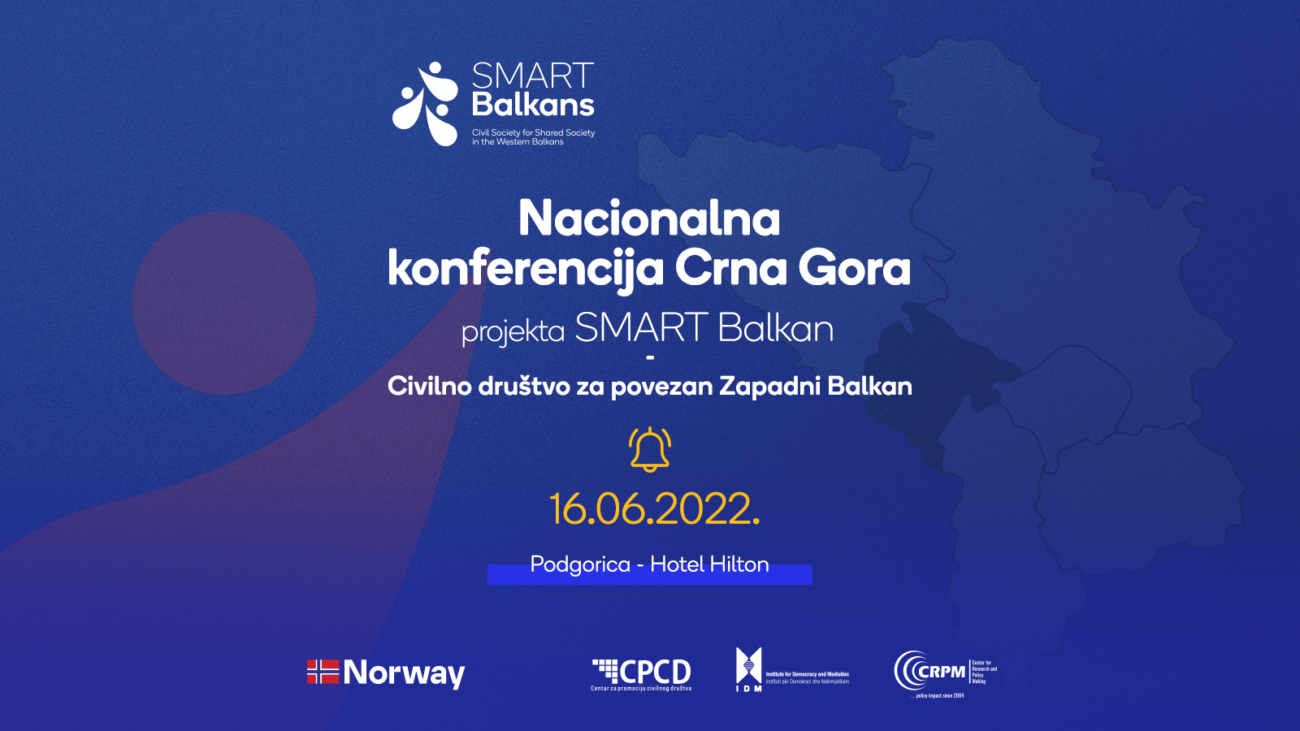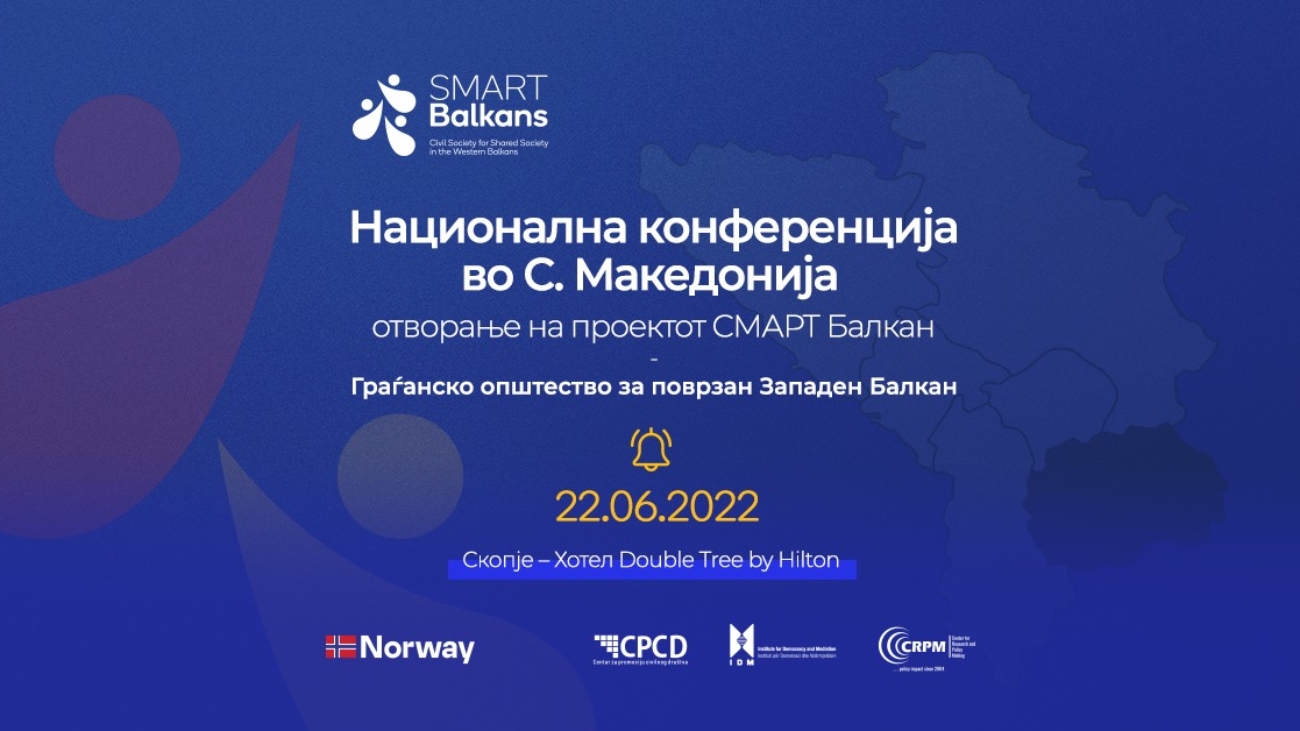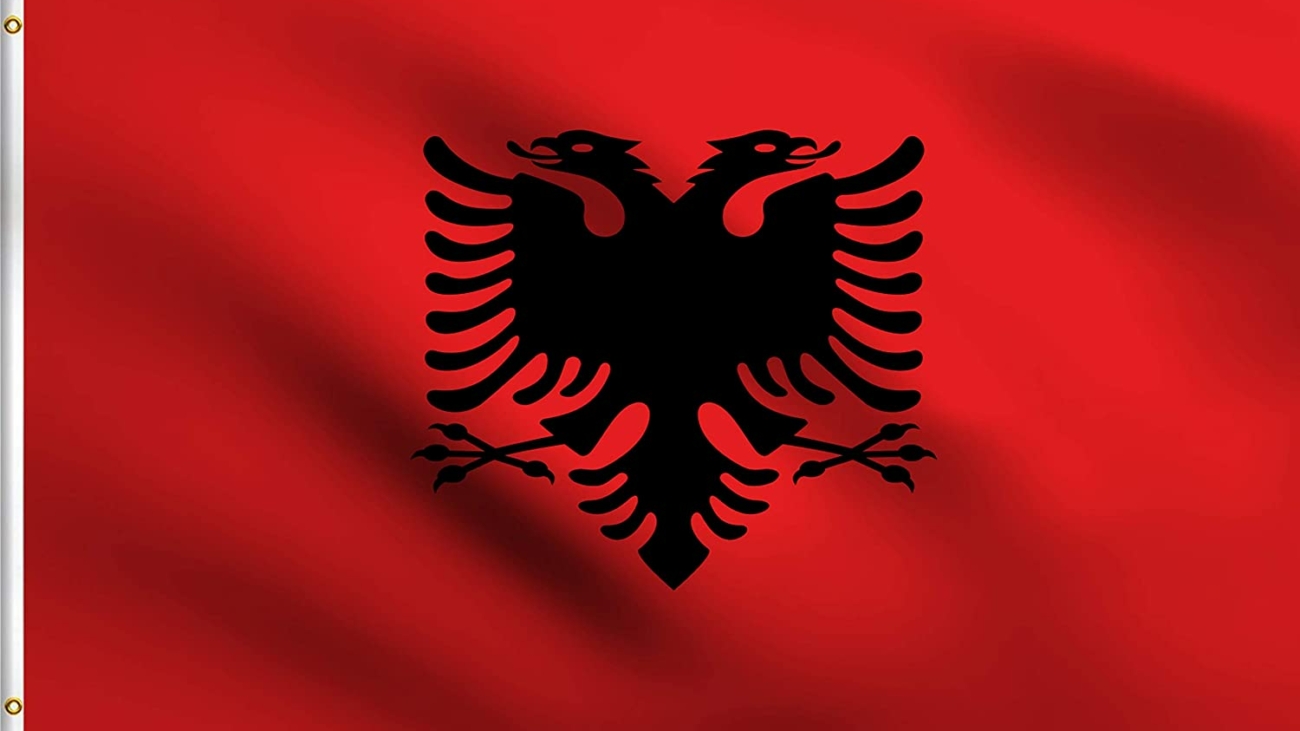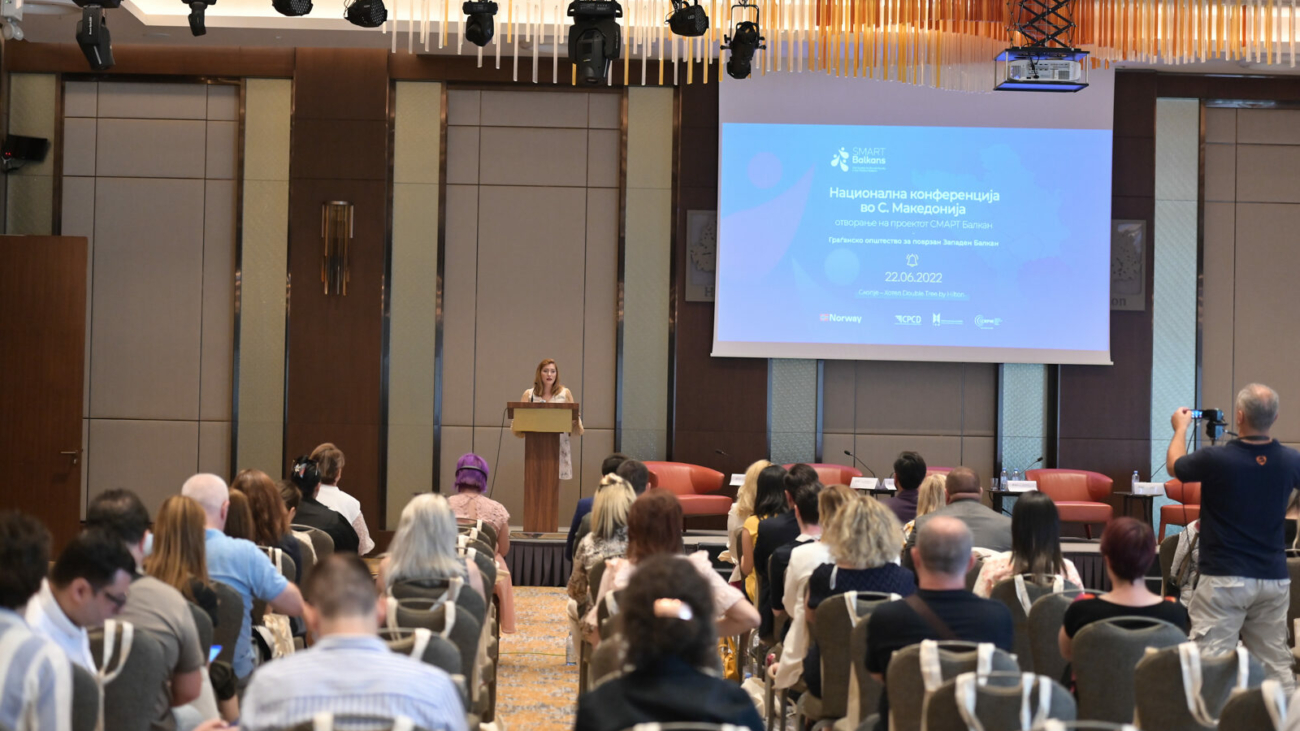Kick – Off National Conference in Montenegro
Center for Civil Society Promotion, (CPCD), in cooperation with partner organizations from North Macedonia – Center for Research and Policy Making (CRPM) and Albania – Institute for Democracy and Mediation (IDM), with the support of Ministry of Foreign Affairs of Kingdom of Norway, is organizing a National Conference as a kick – off opening of project “SMART Balkans – Civil society for Shared Society in the Western Balkans” on Thursday, June 16, 2022 at Hotel Hilton Podgorica in Montenegro.
The aim of the conference is introduction of the project, as well as of financing opportunities through 450 grants for civil society organizations in the whole region of Western Balkans. Other discussion topics will be the state of safety and security sector and good governance practices in Montenegro and the region.
More soon…
Project Opening Conferences in 6 Countries
Center for the Promotion of Civil Society (CPCD) in cooperation with partner organizations from Northern Macedonia – Center for Research and Policy Making and Albania – Institute for Democracy and Mediation, from 1.1.2022. is implementing one of the largest projects in the field of civil society development, SMART Balkans – Civil Society for a Connected Western Balkans. The four-year project aims to strengthen participatory democracy and Euro-Atlantic integration in the Western Balkans through strengthening civil society organizations (CSOs) and networks to play a stronger and more active role in creating more inclusive sustainable development societies in Albania, Bosnia and Herzegovina, Kosovo, Montenegro, Northern Macedonia and Serbia. The 17 million EUR project is fully funded by the Ministry of Foreign Affairs of the Kingdom of Norway through our consortium. Most of the project funds relate to the distribution of over 450 grants, capacity building of CSOs and campaigns in two thematic areas security and stability, rule of law and governance, with a strong aspect of regional cooperation.
Conference in BiH will be held at the Novotel Bristol Hotel, June 14, 2022. starting at 10:30 a.m., Applications for participation in the Conference are open via the link:
https://forms.office.com/pages/responsepage.aspx?id=psfCGfRiEEePpC_NF9olccLL5vpYkHNHviTzk8P-q8pUMlEwS1dOTDRCWEJBR0dDUkNOUlA0SjhZOS4u&web=1&wdLOR=c381EF1C0-B665-4975-BCA0-BF64AA00BF48&fbclid=IwAR3iBj25VOmVcjuyDynncJevDXFPy3CAxrECBlQ83O6PuuSWBTqjj-lM3hs
Conference in Montenegro will be held at Hotel Hilton, June 16, 2022 starting at 10:30 a.m., Applications for participation in the Conference are open via the link:
https://forms.office.com/pages/responsepage.aspx?id=psfCGfRiEEePpC_NF9olccLL5vpYkHNHviTzk8P-q8pUOEpOREZBSVU5NEFJNkpRQkFLNUM3WDk0Sy4u&fbclid=IwAR3FeKzgG4yMxpXbLWauXuJNLDSuAiXwiafVsVjdyxhgXZLVd2IuWpFtc1o
Conference in Albania will be held at Tirana International Hotel, June 17, 2022 starting at 10:30 a.m., Applications for participation in the Conference are open via the link:
https://docs.google.com/forms/d/e/1FAIpQLSf4NImLEPdbYdL3GiXC0M0R7DtUqN7nn-aSRBF3Jd4HeblFSQ/viewform
Conference in Kosovo will be held at Swiss Diamond Hotel Prishtina, June 23, 2022 starting at 10:30 a.m., Applications for participation in the Conference are open via the link:
https://docs.google.com/forms/d/e/1FAIpQLSeSMdGrpzQM4QxPL8x1UdU1MW3aETdy_FBAz8isVHzt7giTaA/viewform
Conference in North Macedonia will be held at Hotel Double Tree by Hilton Skopje, June 22, 2022 starting at 10:30 a.m., Applications for participation in the Conference are open via the link:
https://docs.google.com/forms/d/e/1FAIpQLSfU0wVqyujvLM8JbeT99BA5qpEIzCtBLQWuWtRfNvdQaJyQAQ/viewform
Conference in Serbia will be held at Hotel Metropol, June 30, 2022 starting at 10:30 a.m.
Albania
Republic of Albania
The Republic of Albania has a population of 2,793,592 inhabitants (INSTAT, 2022) marking a decrease of 1.3%, compared to the same period of the last year.
Albania is a post-communist country that has undergone a difficult transition period in the economic, social, and political spheres, as well as in the creation of a stable democracy in country, after the fall of the communist regime in 1991. Albania has been part of NATO since 2009 and is also a candidate for membership in the European Union.
One of the country’s main goals for a long time has been integration into the European Union. This process is a national strategic priority and has been at the top of the country’s government agenda. Albania marked an important step towards this strategic priority, as the European Union has decided to open negotiations for Albania’s integration into the European Union on July 19, 2022. The opening of accession negotiations took place eight years after Albania obtained the status of a candidate country and 16 years after the signing of the Stabilization and Association Agreement. In the meantime, with the official opening of negotiations, a technical process of control and alignment of Albanian legislation to the European Union will begin.
In recent years, many political and social events have affected the situation of stability, security and good governance in the country. Albania is governed for the third consecutive term by the Socialist Party, after the last parliamentary elections in 2021, while the opposition faced internal divisions and the weakening of influence in the country, reducing the opportunities of Albanian voters to choose different political alternatives. During this time, various antigovernmental protests have been organized by political parties as well as by citizens to address the problems of poverty, rising prices, difficult living conditions in the country, and various decisions taken by the government.
In addition, corruption and organized crime remain serious problems despite recent government efforts to address them. According to the Opinion poll (IDM, 2020) shows that 86.7% of Albanian citizens reported that they perceive ‘petty’ corruption to be widespread, while 84.1% reported ‘grand’ or high-level corruption to be widespread.
Beside from the political sphere, the economic and social situation of Albania has also been affected by the consequences of extraordinary situations such as the earthquake that occurred in November 2019, which was estimated by the World Bank with a damage of 820 million dollars. The reconstruction process has been in the priorities of the government, different donors and civil society organizations. The situation of COVID 19 is another extraordinary situation with a significant impact on the country’s economy.
The environment in which civil society organizations operate in Albania is challenging, and according to the Commission Report (2021),the implementation of the road map for enabling environment for civil society has been limited. The Government developed the Road Map for the Government Policy towards a More Enabling Environment for Civil Society Development for the period 2019-2023, which focuses on four strategic directions; i) institutionalizing the Government- civil society cooperation in policy making and EU integration; ii) improving legal environment and data governance; iii) improving fiscal and funding framework; iv) supporting the implementation of the law on public consultation through all policy dialogue processes. However, given the poor implementation of the 2015 Road Map, which finished with nearly 80 percent of planned actions reported as unimplemented, CSOs have low expectations for the realization of the revised Road Map. Moreover, the Road map remains largely unknown document for CSOs.
Also, there have been several attempts that allow the civil society involvement and contribution in Albania, which are; I. The National Council for European Integration is one of the mechanisms for the involvement of the CSOs in the EU integration process. The council promotes comprehensive cooperation between public institutions and civil society, and ensures increased transparency in decision-making on integration issues; II. The European Integration Partnership Platform represents another mechanism for CSOs proactive participation and contribution to the EU accession negotiation process and in the Stabilization and Association Process.
Financial stability and adequate participation of civil society in decision-making and policy documents remain fundamental challenges for the sector in Albania. While it is important to review and improve the legal and fiscal framework for civil society, it is also critical to create real opportunities and platforms for meaningful civil society participation that bring the voice of citizens into decision-making.
Strategies:
National Plan for European Integration (NPEI) 2021-2023
Law on registration of Non-Profit organizations
Roadmap for the Government Policy towards a More Enabling Environment for Civil Society
National Strategy for Gender Equality 2021-2030
Contribution of the SMART Balkans project
SMART Balkans Project will directly contribute to addressing the European Commission’s recommendation on the implementation of the revised road map for the Government Policy towards a More Enabling Environment or Civil Society Development (2019-23). In addition, the project would support CSOs to enhance their contribution and engagement to the EU integration process, strengthen their financial and organizational capacities and increase their meaningful participation in the field of security, stability and good governance.
SMART Balkans National Conference in Skoplje
The National Conference within the project SMART Balkans – Civil Society for Shared Society in the Western Balkans was held on 22.05.2022 in the hotel Double Tree by Hilton. It was attended by more than 60 representatives from CSOs, institutions, and citizens from N. Macedonia and 10 panelists. In addition, two very productive panel sessions took place within the conference themed: Perspective of security and stability in the Western Balkans Region and Good Governance and EU integration in the WB Region: situation and role of CSOs.
Ms. Marija Risteska, Executive Directress of the Center for Research and Policy Making, opened the National Conference and, in the opening speech, she emphasized that the civil society and the media from the region need support that will enable them to be sustainable, objective, and independent, the SMART Balkans program meets this need and aims to build their capacities.
The Ambassador of Norway in Republic of Serbia, Montenegro and N. Macedonia H.E. Jorn Gjelstad, further stated “The civil society is one of our most trusted partners, and I am happy to inform you that today we are launching our new financing facility for the next four years, until the end of 2025. The Norwegian Government has set aside 17 million Euros for this programme alone, making it one of the largest programmes of Norway in this region. “Governance” and “Security and Stability” stand out as Norway’s strategic priorities in N. Macedonia. To be more concrete, we want to contribute to strengthening participatory democracies and Euro-Atlantic integration by empowering civil society to play a stronger and more active role in creating peaceful and inclusive societies for sustainable development. “
The overall objective of the project is to contribute to strengthening participatory democracies and Euro Atlantic integrations in the Western Balkans by empowering civil society organizations and CSO networks for stronger and active role in creating peaceful and inclusive societies for sustainable development in Albania, Bosnia and Herzegovina, Kosovo, Montenegro, North Macedonia and Serbia.
The project’s primary focus is a distribution of more than 450 grants, in 6 countries, particularly more than 150 grants in N. Macedonia, for four years and capacity building of CSOs.
The Project SMART Balkans – Civil Society for Shared Society in the Western Balkans started with the implementation on 1.1.2022 and is fully funded by the Ministry of Foreign Affairs of the Kingdom of Norway. The four-year project is one of Norway’s most extensive programs in the region of over EUR 17 million and is implemented by a consortium of three organizations from the region: Center for Civil Society Promotion (CPCD) from BIH, in cooperation with partner organizations Center for Research and Policy Making (CRPM) form N. Macedonia and Institute for Democracy and Mediation (IDM) from Albania.

